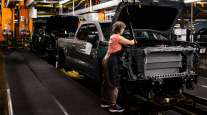Ford’s F-150 Leaves Tough Choices for EV Tax Credits

[Stay on top of transportation news: Get TTNews in your inbox.]
Americans love a Ford pickup truck; it’s one of the few constants of the car business. So it was a huge win on April 18 when Ford’s F-150 Lightning became one of just 10 vehicles to qualify for the full $7,500 in tax breaks laid out by the U.S. Inflation Reduction Act. Dozens of other electric cars and trucks didn’t make the cut, either because they aren’t manufactured in the U.S. or don’t use American parts and pieces.
The tax credits also only apply to new EVs with a sticker price below $55,000, or trucks and SUVs priced under $80,000. And that’s where Americans’ truck lust is butting up against their taste for high-end trims. While the average gasoline-powered F-150 now sells for almost $63,000 — 25% more than five years ago — the electric version commands a premium of almost 30% over that, selling for $80,300 on average last month, according to Edmunds. That means roughly half of Ford’s electric pickups are too fancy for federal incentives.
“Honestly, I’m not even sure you can order the lower-end models at the moment,” said Zach Westrum, owner of Granger Motors, a Ford dealership near Des Moines, Iowa. “We’re about to find out very soon if these are just a second car for an affluent person or can become a primary car for a regular person.”
The other nine EVs that qualify for federal incentives aren’t moving the emissions needle very far, either. Three of them — Chevrolet’s Blazer, Equinox and Silverado — have yet to be delivered to buyers. Two of the eligible vehicles still burn gasoline: the hybrid Chrysler Pacifica and the Lincoln Aviator. Nix all those options and the aspiring subsidy hunter is left with a couple of Teslas and the humble Chevrolet Bolt.

To be sure, the rebate funnel will widen considerably over time. Car companies are already tearing up factory plans and redirecting capital to EV plants and parts pipelines based in the U.S.
Most recently, Volkswagen said it would build a $2 billion factory in South Carolina to launch its new brand of electric SUVs, Scout Motors. “We view it simplistically a little bit like the Gold Rush,” Scout CEO Scott Keogh told Bloomberg in March. “There’s never been a better time to build a factory in America.”
Want more news? Listen to today's daily briefing below or go here for more info:




